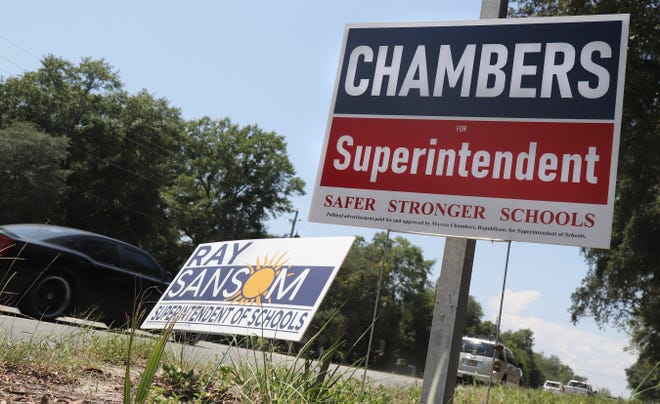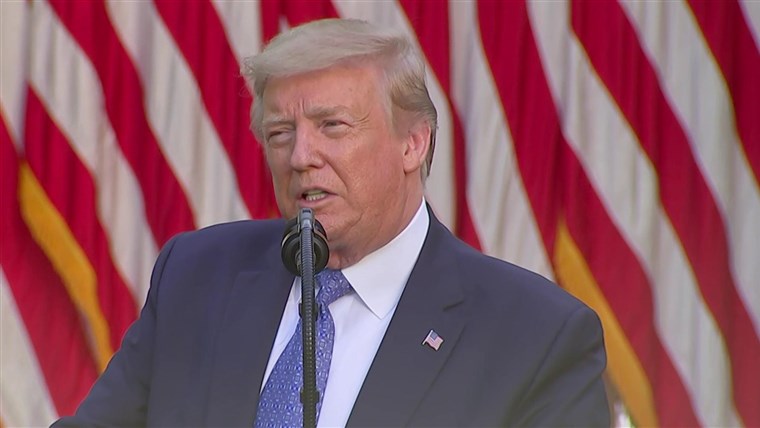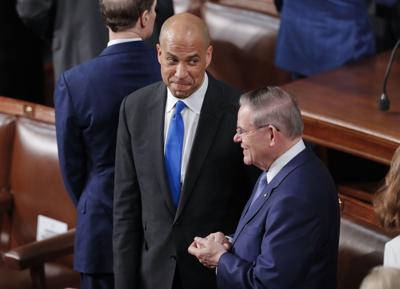
President Trump and Canadian Prime Minister Justin Trudeau shake hands at the Group of Seven Summit last month in Biarritz, France. (Nicholas Kamm/AFP/Getty Images)
TORONTO — Canada’s federal election campaign wasn’t 48 hours old, and the candidates were already trying to smear a rival, by comparing him to a politician who won’t appear anywhere near the ballot next month.
The venue was the campaign’s first debate, this month in Toronto. The punching bag was Conservative Party leader Andrew Scheer.
Green Party leader Elizabeth May told Scheer she had reviewed his foreign policy proposals and drawn a conclusion: “If anyone wants to know where you stand, just figure out what Trump wants.”
New Democratic Party leader Jagmeet Singh piled on, saying Scheer “seems to be willing to do whatever it takes to support and continue Trump’s policies.”
Polls show President Trump is deeply unpopular in Canada, a long-standing U.S. ally on which he has imposed tariffs and whose prime minister he has called “weak” and “dishonest.” But as leader of Canada’s closest security partner and biggest trading partner, Trump remains an important figure here. And Canada has been asking the United States for help in getting China to free two Canadians being held there. All this means Trump could play an unusual role in the federal election campaign.
Party leaders here are unlikely to alienate voters if they criticize the president; a man at a town hall in British Columbia this year offered to buy Prime Minister Justin Trudeau a beer if he would “just push him off a cliff.” (The Liberal Party leader declined, saying Canadians shouldn’t stoop to “insults and jokes.”)
But candidates must also tread lightly: Trump is seen as an easy target; spending too much time on him could backfire as cheap politicking at the expense of more substantive campaigning. And the eventual winner will have to work with him.

Green Party leader Elizabeth May, Conservative Party leader Andrew Scheer and New Democratic Party leader Jagmeet Singh take part in a Toronto debate last week. Trudeau, the Liberal Party leader, skipped the event. (Pool/Reuters)
There’s an extra challenge for Scheer and the Conservatives.
“They don’t really want to align themselves with a far-right, reactionary or hard-line approach that they see coming out of the United States, but they still want to be Conservatives,” said Laura Dawson, director of the Canada Institute at the Wilson Center. “To be too closely aligned to the values and beliefs of the current White House incumbent would be dangerous for any Canadian.”
Trudeau, locked in a tight race with Scheer, has cast himself periodically as a liberal foil to Trump, and has tried to tie his conservative rivals to the president and his policies. But he is careful in how he does so, rarely mentioning the president by name.
[Trudeau launches Canada’s election season dogged by scandal, Scheer]
The day after Trump issued his 2017 executive order banning entry to refugees and visitors from seven countries with Muslim majorities, Trudeau posted a tweet widely seen as a dig: “To those fleeing persecution, terror & war, Canadians will welcome you regardless of your faith. Diversity is our strength. #WelcomeToCanada.”
After a gunman killed 51 people at two mosques in New Zealand in March, Trudeau said some of the blame should fall to politicians who “routinely fail to denounce this hatred” and who “actively court those who spread it.”
In a notable shift, though, the Liberal Party released an ad over the weekend naming Trump and using his image. Narrated by Foreign Minister Chrystia Freeland, it opens with a video of Trump and Trudeau shaking hands at the White House in 2017.
“When it was time to push for a better NAFTA deal, your Liberal government fought tooth and nail to protect your jobs,” Freeland says. “We stood up to Donald Trump on trade when the Conservatives wanted Canada to back down.”

Trudeau greets supporters in Windsor, Ontario, on Monday. (Sean Kilpatrick/Canadian Press/AP)
Is Trudeau trying to provoke an attack from the Oval Office?
Pollster Nik Nanos said it wouldn’t necessarily be a “kiss of death” for Trudeau, given the president’s unpopularity among Canadians.
After Trump called the prime minister dishonest and weak last year, Trudeau’s political foes rallied to his side. Lawmakers unanimously adopted a motion in Parliament rejecting “disparaging ad hominem statements by U.S. officials.” Even the populist premier of Ontario, Doug Ford — far from a Trudeau enthusiast — rose to his defense, saying he stood “shoulder to shoulder with the prime minister.”
Does Trump plan to weigh in on the election? The State Department referred questions to the White House. The White House declined to comment. The Trump campaign didn’t respond.
[Trudeau is down in the polls. Can Conservatives take advantage?]
If Trump would prefer a Scheer victory, he might do better to stay out of the election. May, the Green Party leader, spoke of the president’s rallying effect.
“Nothing makes me feel like a loyal Canadian who will stand up for a Canadian prime minister of any stripe like the idea of Donald Trump attacking them,” she told The Washington Post.
A Liberal official, who spoke on the condition of anonymity because he was not authorized to talk to the media, said Trudeau views the renegotiation of the North American Free Trade Agreement — it has become the U.S.-Mexico-Canada Agreement, awaiting ratification by both Parliament and Congress — as a key accomplishment and will bring it up often because he doesn’t believe the Conservatives would have achieved a better deal.

Scheer acknowledges a supporter in Trois-Rivieres, Quebec. (Paul Chiasson/Canadian Press/AP)
During the first debate, Scheer accused Trudeau of making “concession after concession after concession to Donald Trump without getting any wins back for Canada.” (Trudeau did not attend the debate.)
But Scheer has been careful in his criticism of the president.
After Trump said four minority Democratic congresswomen should “go back” to where they came from, Scheer condemned the “divisive comments” — but like Trudeau, he stopped short of calling them racist.
“They should be able to advocate for their own ideas without having their background or their personal identity or where their family might come from questioned in any way,” Scheer said.
Such comments have left both Scheer and Trudeau open to criticism from the left for not being tough enough on Trump.
During the debate, Singh attacked both leaders for failing to condemn more forcefully the Trump administration’s immigration policies and use of child detention facilities at the U.S.-Mexico border.
“To not call that out for the shameful act that it is shows weakness,” Singh said.
Trudeau and Scheer are the likeliest candidates to become prime minister and thus to have to work with Trump after the election. Robert Bothwell, a professor of Canadian history at the University of Toronto, called the task of trying to figure out how to talk about him on the campaign trail unenviable.
“It’s like tiptoeing around a dragon and hoping the beast doesn’t wake up,” he said.
Read more:
Trudeau is admonished a second time for conflicts of interest
Conservative wave could threaten Trudeau
Months before Canada’s election, Trudeau’s colorful mother takes the stage to tell all
Today’s coverage from Post correspondents around the world
Like Washington Post World on Facebook and stay updated on foreign news


